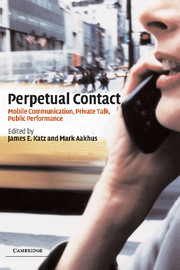Book contents
- Frontmatter
- Contents
- List of figures
- List of tables
- Notes on the contributors
- Preface and acknowledgments
- 1 Introduction: framing the issues
- PART I Mobile communication: national and comparative perspectives
- 2 Finland: a mobile culture
- 3 Israel: chutzpah and chatter in the Holy Land
- 4 Italy: stereotypes, true and false
- 5 Korea: personal meanings
- 6 United States: popular, pragmatic and problematic
- 7 France: preserving the image
- 8 The Netherlands and the USA compared
- 9 Bulgaria: mobile phones as post-communist cultural icons
- PART II Private talk: interpersonal relations and micro-behavior
- PART III Public performance: social groups and structures
- Appendixes
- Index
4 - Italy: stereotypes, true and false
Published online by Cambridge University Press: 22 September 2009
- Frontmatter
- Contents
- List of figures
- List of tables
- Notes on the contributors
- Preface and acknowledgments
- 1 Introduction: framing the issues
- PART I Mobile communication: national and comparative perspectives
- 2 Finland: a mobile culture
- 3 Israel: chutzpah and chatter in the Holy Land
- 4 Italy: stereotypes, true and false
- 5 Korea: personal meanings
- 6 United States: popular, pragmatic and problematic
- 7 France: preserving the image
- 8 The Netherlands and the USA compared
- 9 Bulgaria: mobile phones as post-communist cultural icons
- PART II Private talk: interpersonal relations and micro-behavior
- PART III Public performance: social groups and structures
- Appendixes
- Index
Summary
Introduction
The data for this chapter come from three research projects sponsored by Telecom Italia over the years 1996 to 1998. The first, ‘Verso uno scenario europeo delle telecomunicazioni’ (Towards a European Scenario of Telecommunications, 1996a) consisted of a telephone survey in 1996 in five European countries (Italy, France, Germany, Spain, and the UK) with a sample of 6,609 subjects. The second, ‘La rappresentazione sociale delle telecomunicazioni’ (The Social Representation of Telecommunications), was conducted in 1996 in Italy on two different samples. The first sample consisted of 1,400 randomly selected individuals who were interviewed over the phone and who also responded to a free association exercise, also given via telephone. The second group consisted of a convenience sample of 303 selected subjects, of 15 years of age and over, who filled out a questionnaire containing a semantic differential with twenty-five concepts and twenty-three scales (1996b). The third research project, entitled ‘La competenza d'uso delle tecnologie comunicative’ (Competence in Using Telecommunication Technologies), was a 1998 telephone survey in Italy with a sample of 1,400 subjects.
Apart from the semantic differential group, the samples were representative of the broader Italian population in terms of gender, age and geographical area of residence. Incidentally, the research program explored all major means of communication. The mobile phone was not a particular focus, so we do not have as much data on this particular technology as one might wish.
- Type
- Chapter
- Information
- Perpetual ContactMobile Communication, Private Talk, Public Performance, pp. 42 - 62Publisher: Cambridge University PressPrint publication year: 2002
- 61
- Cited by



